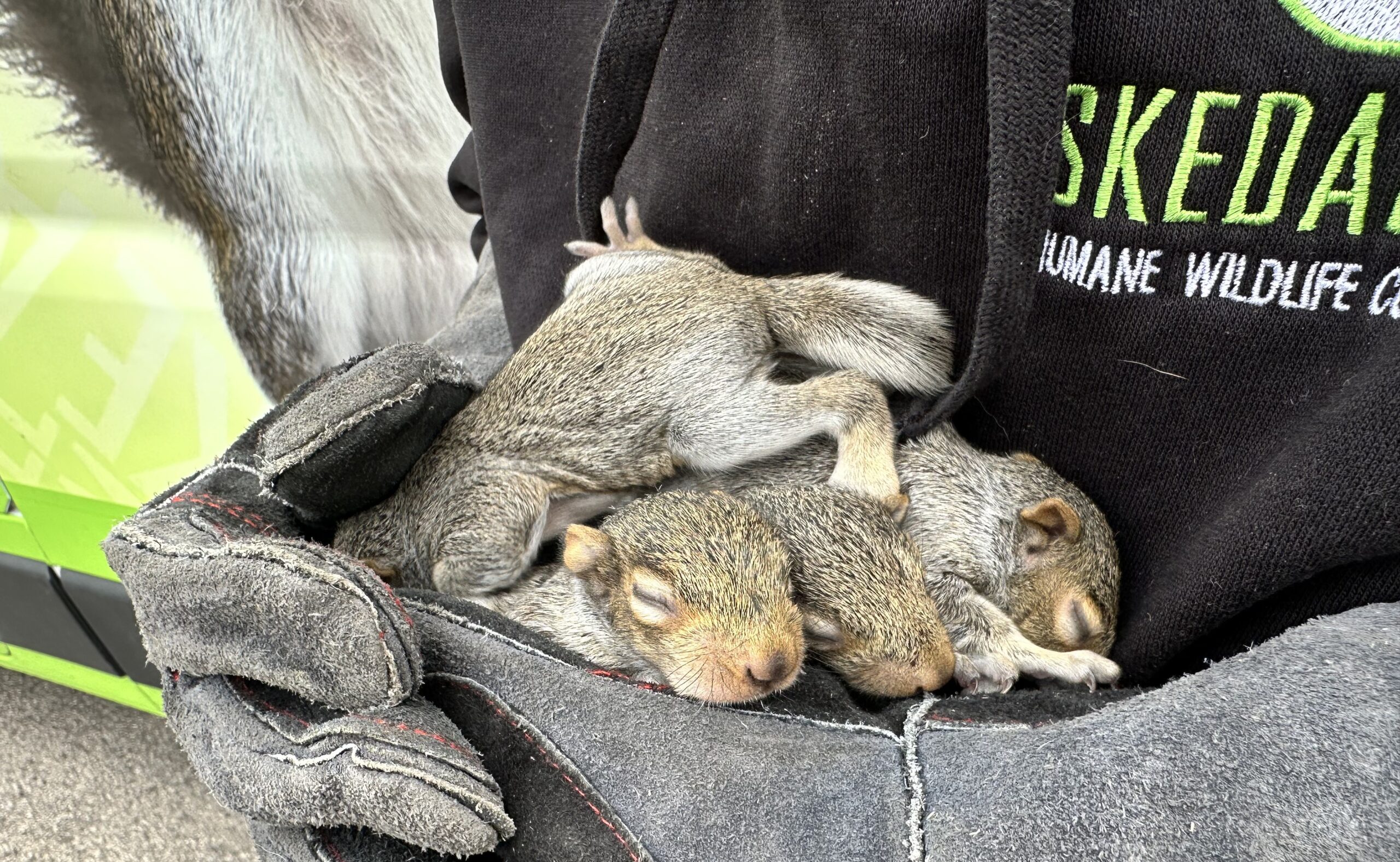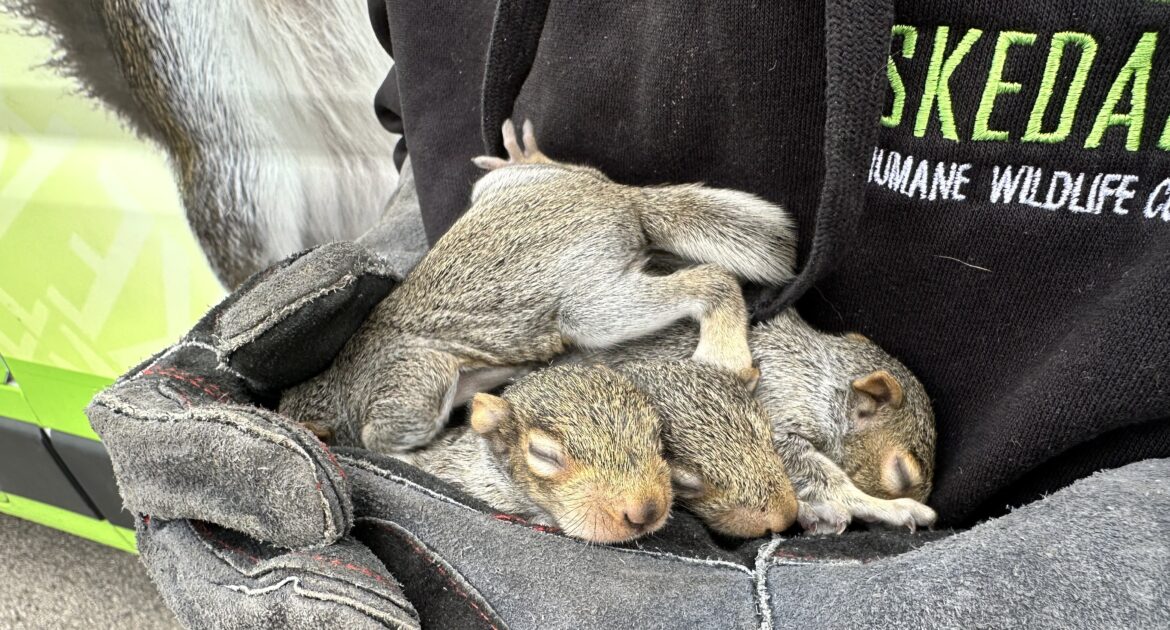You step outside your Vancouver home on a crisp morning, and there they are—bushy-tailed squirrels leaping from tree to tree with amazing skill.
These furry animals might seem like simple backyard visitors, but they’re actually some of nature’s most important workers.
The relationship between squirrels and forest ecosystems is much deeper than most people realize. These small creatures play a huge role as environmental helpers, keeping our forests healthy and thriving.
What makes these little animals so special? The eco role of squirrels goes far beyond collecting nuts for winter. They work as forest gardeners, seed planters, and ecosystem engineers. From the coastal forests near Vancouver to woodlands across Canada, these bushy-tailed heroes help create the green spaces we all love.
At Skedaddle Humane Wildlife Control, we understand just how important these animals are to our environment and work to protect their role in nature. Their daily activities shape entire forest communities in ways that might surprise you.
Let’s explore as this blog breaks down the eco role of squirrels in more detail.
Nature’s Gardeners at Work
Have you ever watched a squirrel bury an acorn? You’re seeing one of nature’s most important jobs in action. These animals are master planters who help forests grow and spread naturally.
When autumn arrives, they get busy collecting seeds, nuts, and acorns. They don’t eat everything right away—instead, they bury their treasures in different spots across the forest floor. This behaviour, called caching, helps them survive winter when food is hard to find.
But here’s the amazing part: they don’t remember where they buried everything. Those forgotten seeds and nuts become new trees and plants. Scientists estimate that one squirrel can plant thousands of trees during its lifetime without even trying! This makes them incredibly important for forest health and growth.
Their planting work helps forests in several key ways:
- Creates new tree groves in open areas
- Spreads different tree species across wider areas
- Helps forests recover after fires or storms
- Maintains genetic diversity in tree populations
Soil Engineers and Forest Builders
You might not think of these small animals as construction workers, but that’s exactly what they are. Their digging and burrowing activities change the soil in ways that help entire forest communities thrive.
When they dig holes to bury food or create homes, they mix up the soil layers. This process, called bioturbation, brings nutrients from deep underground to the surface where plants can use them. Fresh air also gets into the soil through their tunnels, helping plant roots grow stronger.
Their digging creates perfect spots for seeds to germinate, too. The small holes they make give seeds protection from wind and rain while providing the right conditions for sprouting. Many wildflowers and small plants depend on these disturbed soil areas to get started.
Food Web Connections
Every forest ecosystem works like a giant web, with each animal playing an important role. These bushy-tailed creatures sit right in the middle of this web, connecting many different species together.
They eat a wide variety of foods throughout the year. In spring and summer, they munch on tree buds, flowers, and young leaves. Fall brings their favourite nuts and seeds, while winter meals might include tree bark and stored food. This varied diet makes them important for controlling plant populations and spreading nutrients through the forest.
At the same time, they provide food for many predators. Hawks, owls, foxes, and other animals depend on them as a food source. Without healthy squirrel populations, many predators would struggle to survive.
Their nests, called dreys, also support other forest life. Old nests become homes for birds, insects, and small mammals. Even their leftover food scraps feed countless smaller creatures on the forest floor.
Climate Change Helpers
As our planet faces climate change, these forest workers become even more valuable. Squirrels help forests adapt to new conditions in several big ways:
- Seed-Planting: Squirrels bury seeds that can grow into trees in new places. This helps trees move to higher or cooler spots as temperatures change.
- Natural Migration: Their work lets trees spread out and find better places to live as the climate shifts.
- Building Strong Forests: By planting many kinds of seeds, squirrels make forests more diverse. Forests with lots of different trees and plants handle climate change better.
- Resilience: Strong, mixed forests are less likely to get sick or damaged in bad weather because of the wide range of trees squirrels help grow.
Because of squirrels and forest ecosystems, forests can stay healthy, even when the environment changes.
Urban Forest Champions
In cities like Vancouver, these adaptable animals play a big role in helping urban forests and green spaces. They face new challenges in the city, but they’ve learned how to do well in parks, neighbourhoods, and wooded spaces.
Here’s how squirrels and forest ecosystems help make city life better:
- Connecting Green Spaces: They carry seeds from one park or garden to another. This builds plant corridors that connect different parts of the city.
- Supporting Wildlife: By bringing new plants to open spaces, they help urban wildlife find food and shelter.
- Cleaner Air: More plants and trees mean fresher air for everyone living in Vancouver.
- Filling Nature’s Gap: In cities, some natural processes get left out. Squirrels keep planting seeds and mixing soil, making sure the city’s green spaces stay healthy and full of life.
Squirrels as environmental helpers work all around Vancouver, making it a better place for people and animals alike.
Seed Specialists with Amazing Skills
Squirrels come in several different species, and each has special skills that help forests grow:
- Grey Squirrels: These are great at carrying nuts far from their homes, sometimes travelling several kilometres. By spreading seeds this way, they help forests grow in new places.
- Red Squirrels: They love coniferous seeds and play a big part in keeping evergreen forests healthy and strong.
- Flying Squirrels: They can glide between trees, carrying seeds to areas ground squirrels can’t reach. This helps connect different forest patches so plants and animals can move around more easily.
Squirrels are also known for their amazing memories. They use smells, landmarks, and their sense of space to find most of the seeds they bury. Even when they forget a few, those buried treasures turn into new plants and trees, helping keep forests full and green.
Their different skills and habits all help build and protect forest ecosystems, showing just how important squirrels are to the health of our forests.
Supporting Forest Health Through Professional Care
While we celebrate these amazing eco warriors, sometimes they need help when they conflict with human spaces. Professional wildlife control ensures both human safety and animal welfare while protecting their important ecological role.
When these industrious creatures move into attics or cause property damage, it’s important to handle the situation properly. Trained professionals understand their behaviour and can resolve conflicts humanely while respecting their vital role in forest ecosystems.
The Forest’s Future Depends on These Heroes
The eco role of squirrels in maintaining healthy forests cannot be overstated. These remarkable animals work tirelessly as environmental helpers, creating and maintaining the green spaces that benefit all of us. From Vancouver’s urban forests to wilderness areas across Canada, their daily activities shape entire ecosystems.
Understanding squirrels and forest ecosystems helps us appreciate these often-overlooked heroes. They prove that even small animals can have enormous impacts on the world around them. Next time you see one of these bushy-tailed acrobats in action, remember—you’re watching a forest engineer at work.
If you’re experiencing conflicts with these important ecosystem workers on your property, Skedaddle Humane Wildlife Control in Vancouver offers professional solutions that respect both your needs and their ecological importance.
Our one-way door systems allow them to leave your property safely while preventing re-entry, maintaining their role as environmental helpers without compromising your home’s integrity.
Contact us to request an estimate and learn more about humane wildlife management that protects both your property and these vital forest guardians.




